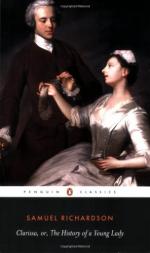Well, but now I give you leave to read here, in this place, the copy of my mother’s answer to your uncle’s letter. Not one comment will I make upon it. I know my duty better. And here, therefore, taking the liberty to hope, that I may, in your present less disagreeable, though not wholly agreeable situation, provoke a smile from you, I conclude myself,
Your ever affectionate and faithful,
Anna Howe.
MRS. ANNABELLA HOWE, TO ANTONY HARLY, ESQ.
Mr. Antony Harlowe,
Friday, may 19.
Sir,
It is not usual I believe for our sex to answer by pen and ink the first letter on these occasions. The first letter! How odd is that! As if I expected another; which I do not. But then I think, as I do not judge proper to encourage your proposal, there is no reason why I should not answer in civility, where so great a civility is intended. Indeed, I was always of opinion that a person was entitled to that, and not to ill usage, because he had a respect for me. And so I have often and often told my daughter.
A woman I think makes but a poor figure in a man’s eye afterwards, and does no reputation to her sex neither, when she behaves like a tyrant to him beforehand.
To be sure, Sir, if I were to change my condition, I know not a gentleman whose proposal could be more agreeable. Your nephew and your nieces have enough without you: my daughter has a fine fortune without me, and I should take care to double it, living or dying, were I to do such a thing: so nobody need to be the worse for it. But Nancy would not think so.
All the comfort I know of in children, is, that when young they do with us what they will, and all is pretty in them to their very faults; and when they are grown up, they think their parents must live for them only; and deny themselves every thing for their sakes. I know Nancy could not bear a father-in-law. She would fly at the very thought of my being in earnest to give her one. Not that I stand in fear of my daughter neither. It is not fit I should. But she has her poor papa’s spirit. A very violent one that was. And one would not choose, you know, Sir, to enter into any affair, that, one knows, one must renounce a daughter for, or she a mother—except indeed one’s heart were much in it; which, I bless God, mine is not.
I have now been a widow these ten years; nobody to controul me: and I am said not to bear controul: so, Sir, you and I are best as we are, I believe: nay, I am sure of it: for we want not what either has; having both more than we know what to do with. And I know I could not be in the least accountable for any of my ways.
My daughter indeed, though she is a fine girl, as girls go, (she has too much sense indeed for one of her sex, and knows she has it,) is more a check to me than one would wish a daughter to be: for who would choose to be always snapping at each other? But she will soon be married; and then, not living together, we shall only come together when we are pleased, and stay away when we are not; and so, like other lovers, never see any thing but the best sides of each other.




